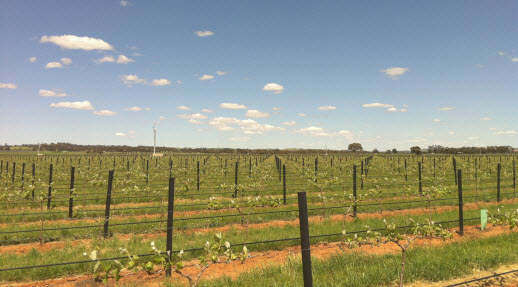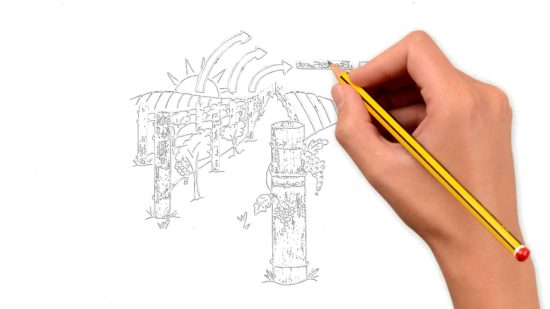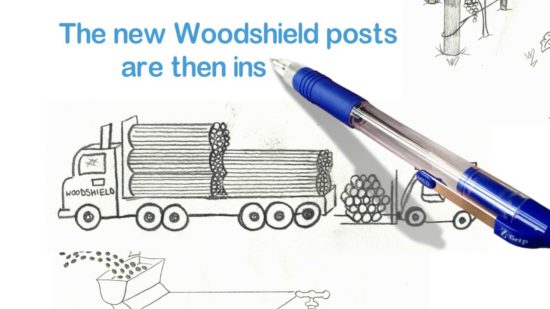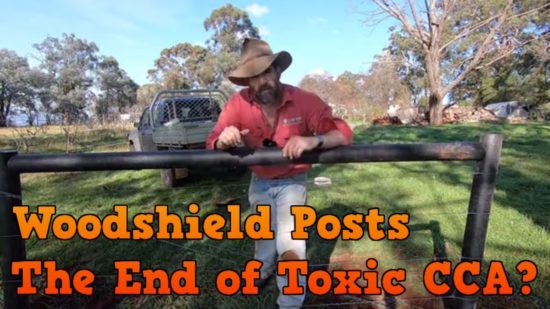Recently WoodShield was interviewed by our organic certifier BioGro for the Dec 2011/Jan 2012 edition of its newsletter BioNews. Click here to see the original article or Click here to download the article in PDF.
Organic growers faced a dilemma when the US clarified the rules in 2010 that the USDA NOP (National Organic Program) did not permit the use of treated timber in organic production areas. The restricted feasible options for such things as fencing and vines has been the source of widespread concern. Concrete posts are no longer sold. Galvanised waratahs are expensive. Eucalyptus posts from forestry thinning can rot after a few years. Few alternatives offered the availability and versatility to fit immediately into existing farming operations.
Now an Australian company has achieved BioGro certification for its sheathed timber posts that offer most of the benefits of treated timber – and possibly more.
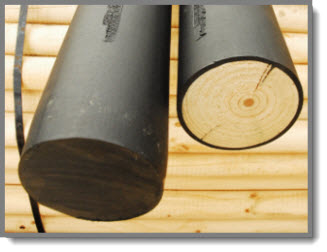 The USDA prohibition applies to lumber used in direct contact with organically produced and handled crops and livestock. (It doesn’t extend to uses suchas lumber for fence posts or building materials that are isolated from the certified production area).
The USDA prohibition applies to lumber used in direct contact with organically produced and handled crops and livestock. (It doesn’t extend to uses suchas lumber for fence posts or building materials that are isolated from the certified production area).
Standard treated timber posts are pressure injected with copper chrome arsenate (CCA). Copper and chromium are preservative but are also considered leachable heavy metal contaminants. Arsenic is an insecticide and can be detected in soil tests and probably taken up by plants. Frogs and other wildlife are also sensitive to it.
Thinking outside the post
In 2003, an Australian team went looking for a better alternative. The idea was to take untreated pine posts and cover them in a plastic shield instead of pumping chemicals into them. They were initially intended for use in vineyards. It took approximately three years to develop and refine the production process, but the approach has now been proven to work in all agricultural applications, and Woodshield PTY Ltd has worldwide patents in place.
BioGro Chief Executive, Michelle Glogau, says it is fantastic to see the company take the initiative to seek certification so that their posts become available to the organic sector. Untreated pine posts are machined to either 75mm or 113mm. Then a 6mm protective layer of UV protected polyethylene pipe grade resin (equivalent to rural polypipe) is applied to encase the post to a finished size of 83mm and 124mm respectively. The process creates a strong adhesive bond between the timber and the plastic sheath completely sealing the post, leaving no timber exposed. Rectangle fencing rails are produced in he same way. The company says the result actually increases the timber’s overall strength.
“the plastic sheath completely seals the post”
WoodShield says Melbourne Testing Services recently completed ‘3 Point Bending Tests’ on the WoodShield posts and the results showed they have a 40-50% higher breaking force than treated pine posts. The breakage deflection angle is also twice that of normal posts. Even breakages at ground level and from mechanical harvesting have been significantly reduced.
“greater strength and rigidity than chemically treated posts”
The post ends are protected with thick end caps which enable the posts to be hydraulically driven into the ground
exactly as a standard timber post would be.
But the company says it has addressed the many issues of chemically treated posts, such as warping, splitting, chemical leaching, rotting and breaking at ground level, making the posts an even better option than CCA posts.
With greater strength and rigidity than standard chemically treated posts, plus the protective properties, toughness and lifespan of polyethylene plastic, the company says there are savings on the replacement and disposal costs associated with treated posts.
As the WoodShield posts are timber, standard fence fastening systems can be used. The plastic coating actually shrinks around nails, staples and screws and seals them.
Fewer insulators are required for electrification, further reducing the overall cost of installation and maintenance, and overall the company says WoodShield posts offer a lower product-life cost than chemically treated posts.
WoodShield says many property owners have had their posts in the ground for up to five years. And while stronger, the posts are lighter and smoother to handle.
The Queensland-based company says it has increased its production capacity to meet growing demand.
WoodShield’s NZ agent is John Sowman, of Marlborough Organics in Blenheim.
wdv@xtra.co.nz, phone 027 248 7668
The company is still seeking a North Island agent.
For further information
www.woodshield.com.au
info@woodshield.com.au
Phone +61 7 3271 5575
Fax: +61 3271 3008
Lot 12, 1 Quarry Road,
Tottenham VIC 3012
Or: PO Box 256, Carole Park QLD 4300
